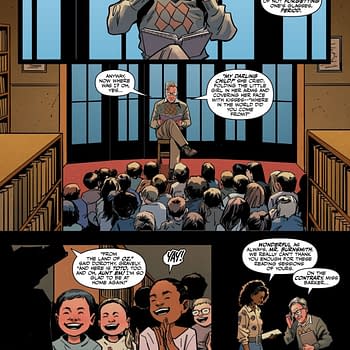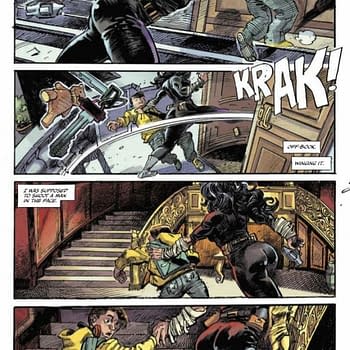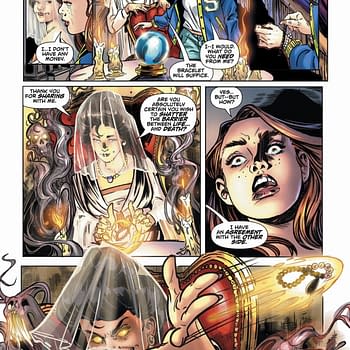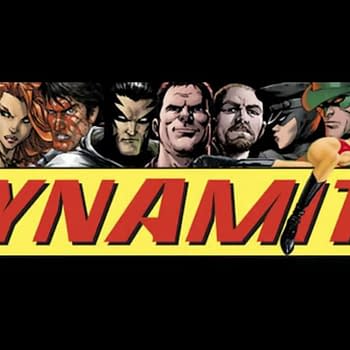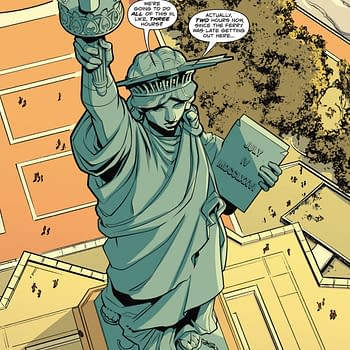Posted in: Comics, Recent Updates | Tagged: Comics, dc comics, Drawn and Quarterly, entertainment, fantagraphics, hate, Margaret Sanger, peter bagge, political cartoons, Reason, Sweatshop, underground comix, Woman Rebel
'Life Is Messy' – Peter Bagge Talks Hate!, Political Cartoons, And Woman Rebel
By Cat Taylor

Although all of us enjoy writing about comics here at Bleeding Cool, it's a special day when one of us gets to interview one of our heroes. That's what happened here for me. It's a short conversation but I'm happy to be able to share it with you.
Cat Taylor: Needless to say, you are probably best known for your work on Hate! One of the reasons I liked that comic so much was because the characters and events seemed to ring true for people of my generation who were part of the counter-culture of the time. I suspect that you wrote a lot of the stories based on first-hand experience. So, was Hate! largely autobiographical or did the ideas come more from other sources of inspiration?
Peter Bagge: My stock answer to this is that the Hate! stories were one third autobiographical, one third events that happened to others that were told to me and one third totally made up. That still feels like an accurate answer! And while the differences between myself and Buddy are obvious (he's not a cartoonist; I'm not an entrepreneur), I at least relate to all his thoughts and impulses.
CT: A lot of comic book readers may not be so familiar with the political cartoons that you've created for Reason magazine. I had only read of couple of them myself until they were collected in Everybody Is Stupid Except For Me….What were the circumstances that led to you doing political cartoons for Reason?
PB: For awhile I was doing illustrated essays for a now defunct satirical commentary website called Suck.com. Many of the contributors to that site also worked for Reason Magazine, so when Suck went under the then managing editor of Reason asked me to contribute to that magazine (and website). He was particularly impressed with a 4 page comic I did for Details Magazine in which I covered a comedy festival, and wanted to stick with that format for them.
CT: On that same subject, your approach to political cartoons is different than what I'm used to seeing. First, most political cartoons solidly reflect the Democrat or Republican hyper-partisan talking points that have politicized everything from Ebola to voter IDs to climate change. On the other hand, your cartoons are from a Libertarian perspective. Did you take this approach initially from a contrarian view or is there another reason that led you down a Libertarian path?
PB: I always thought like a Libertarian, even before I was familiar with the word. My biggest shock in life is that most people DON'T feel that way, and are in favor of punishing anybody for doing anything they don't approve of. But I'm not an ideological purist, and in many of my Reason features I often come away with no answers or conclusions regarding the subject at hand. Life is messy!
CT: That's a good lead-in to my next observation/question. Another way that you approach political cartoons differently is that most of your cartoons seem less smug, condescending, and self-assured than what I'm used to seeing from other political satirists.
When I read something like This Modern World it seems like it's written by a petulant teenager with no purpose other than to get validation of his opinions. Your work is actually funny and often contrary to common absolute and extreme opinions, all while pointing out what hasn't worked in the real world. What message are you trying to send to your readers and what is your thought-process when you take such an atypical approach to political cartoons?
PB: I just try to be honest, and not offer official, party-line answers and solutions to everything. It's a very simple approach to take, though it's one that almost every other political cartoonist studiously avoids. But adhering to a left or right-wing party line means you have a built in audience, so that explains that. Most people don't want to read about any ambiguous gray areas anyway. They want self-assured moral certainty, so that they can feel morally and intellectually superior to their ideological opponents.
CT: Your book Woman Rebel seems like a pretty radical change from the dark humor comics for which you are most known. What motivated you to do a Margaret Sanger biography in the graphic novel format?
PB: I'd been doing short biographical pieces for quite a while now, and was slowly working my way up to longer pieces (12 pages being my pervious "record"). Once I felt ready to tackle a book length biography I pitched the idea to Drawn & Quarterly's publisher, and between the two of us we settled on Sanger as a good first subject. As to why her: I'm fascinated by political and social events from her time period in general, but she herself lead such a wild and productive life that I felt it lent itself well to comics. There also are many falsehoods repeated about her, and I wanted to try to help set the record straight.
CT: Aside from your comic work, you've also played a lot of music with different bands. Since I'd be willing to bet a lot of the readers of Bleedingcool.com aren't nearly as familiar with your musical ventures, what would you like to say about them? Also, what music and/or performers do you really like and which ones do you despise?
PB: I played drums for a 3 piece band called The Action Suits off and on back in the '90s until 2017 (?) or so. We had a simple, indie power pop sound, and mostly played original songs by Fantagraphics honcho Eric Reynolds.
Since then I've been playing guitar and singing harmonies for a power pop band called "Can You Imagine?". We have 2 full length CDs of all original tunes. There's 5 of us, and 4 of us sing, so we have a fuller sound than the Action Suits did. 3 of the singers are female, which also gives us a "girl group" sound.
As is typical of someone my age, I'm very partial to the rock, pop and soul music of the mid-late sixties that I was weaned on, and this influence is quite apparent in my current band. My all time fave bands tend to be the Beatles and their Brit contemporaries, as well as the Beach Boys. I also am partial to many "new wave" bands from the late 1970s. As to which performers I despise: I try not to think about them!
CT: I've noticed a common theme of the repressed, darker self that comes out of hiding in some of your work, specifically Other Lives, Apocalypse Nerd, and Reset. Sometimes the humor in those books gets really dark and pretty uncomfortable. What is it about the "inner evil" of human nature that has led you to include it as a major theme in so much of your work? Do you find it natural to use those themes in stories that have a lot of humor or is it something you struggle to balance in those stories?
PB: I wasn't deliberately trying to "go dark" in any of those graphic novels you mentioned. I simply set up scenarios in each and proceeded to have events unfold as I'd imagine they'd unfold were the situation real. It's also interesting that all three of these books have been frequently described as "science fiction," since all three stories are perfectly plausible to me.
CT: What were the circumstances that led to you doing super-hero comics like Strange Tales and Megalomaniacal Spider-Man for Marvel and why could I never find them when they were first published?
PB: The Spider-Man comic came out as a one shot back in 2002 or so. It was Axel Alonso's idea. The first Spidey movie was about to come out, and he was trying to come up with as much Spidey related material as possible. I was never a big Marvel or superhero fan, but when he asked me to do this I immediately came up with an idea that he approved of.
The plan after that was for me to do something similar for each new Marvel movie that was due to be relased, and next on the slate was The Hulk. I was half done with that comic when Marvel suddenly had new ownership, and they were unhappy with what I was doing with their newly acquired properties. Thus my Hulk comic was shelved and all future places cancelled. My Hulk story finally appeared 10 or so years later, after Marvel was under new NEW ownership!
CT: With all of the rage being on Hollywood adaptations of comic-books, has anyone approached you with the opportunity to adapt any of your work to the big or small screen and what circumstances, if any, would interest you in having your work adapted? For instance, I could see a Hate! animated series having potential if you were directly involved.
PB: A number of my characters have been optioned and/or in development for film or TV many, many times over the last 20 years, though obviously none of these projects have been green lit as of yet. Buddy Bradley as a teen or a young adult has been in development almost constantly, and I'm currently negotiating with Amazon over a development deal with him. Wish me luck. I'll need it!
CT: As a comics reader, I find that most comic books that are supposed to be funny just aren't. However, yours actually make me laugh. Is there a secret that you have that other writers and artists just don't get, and if so will you please share it so other people can create funny comics too?
PB: For me, it's basically trying not to be too clever or self conscious, though that's easier said than done. However, there are many very funny cartoonists who are quite clever, and unabashedly so. So there's no formula for funny, sadly. Different things work for different people.
CT: Are there any comics out there that you would recommend?
PB: I like almost everything published by Fantagraphics and Drawn & Quarterly. So that encompasses a lot! There are so many comic book artists these days that I can barely keep up with it all. It's hard to stay in the loop.
CT: Finally, what upcoming projects are you working on currently and when can we expect to see them?
PB: I'm doing a lot of odd freelance work right now: one page fillers for Creepy, short strips for a Garbage Pail Kids mini series, stuff like that. Plus Reason, as always. But my next BIG project is another full-length bio comic for D&Q, this one on American author and essayist Zora Neale Hurston. It's due out in late 2016. But the next title will be a collection of my short-lived DC comic series called Sweatshop. That's due out in March of 2015, and published by Fantagraphics.
CT: Thanks for your time. We'll be looking forward to your upcoming work and best of luck to you.
Cat Taylor has been reading comics since the 1970s. Some of his favorite writers are Alan Moore, Neil Gaiman, Peter Bagge (seriously, that wasn't just added here for this article!), and Kurt Busiek. Prior to writing about comics, Taylor performed in punk rock bands and on the outlaw professional wrestling circuit. During that time he also wrote for music and pro wrestling fanzines. In addition to writing about comics, Taylor tries to be funny by writing fast food fish sandwich reviews for Brophisticate.com. You can e-mail him at cizattaylor@hotmail.com. He is currently living the life of a stereotypical comic book nerd by editing this interview on a Saturday night instead of doing other things.
















